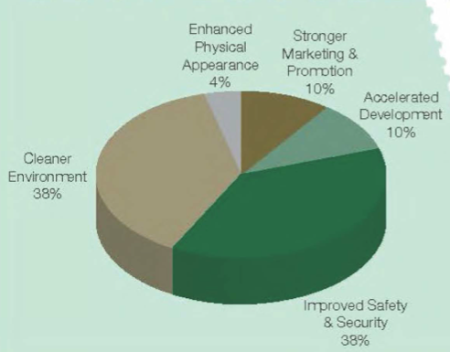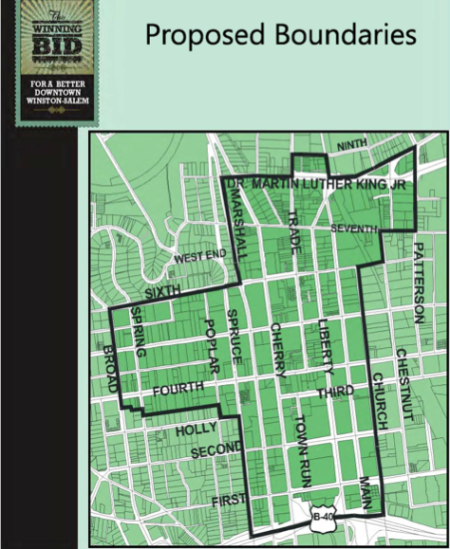Winston-Salem Business Owners Anticipate the Approval of the BID
By Jennifer Koniuk
Although the council vote isn’t until the end of November, many downtown business owners and residents are already anticipating the approval of the business improvement district so the streets will be cleaner and safety will increase. Property owners in the district would pay a tax surcharge to pay for such additional city services.
“It’s hard for someone to honestly say that they don’t support a cleaner, safer downtown,” said Jamie Bartholomaus, co-owner and president of Foothills Brewing on Fourth Street. “If you ask someone if they want to pay taxes sure they’ll say no but if you look at the reasoning behind it, it makes sense.”
At a council meeting this month, only one person spoke in opposition of the business improvement district. In interviews last week, downtown business and property owners said they think the vote will easily pass.
The district, originally proposed by the Winston-Salem Downtown Partnership, will tax property owners in certain areas of downtown. The money would be a sustainable source of funds that will be used to make downtown cleaner, increase safety and security, enhance physical appearance, accelerate development and create stronger marketing and promotion to draw more patrons and investment downtown.
(Courtesy of the Winston-Salem Downtown Partnership)
According to Jason Thiel, president of the Winston-Salem Downtown Partnership, the proposal has been very well received.
Betsy Hamilton, president and partner at Russell Advertising Agency on West Fifth Street, said they would be assessed the tax if the business improvement district moves forward because Hamilton and the two other partners at the agency, own the building occupied by their agency.
Hamilton said they would be taxed about $1,000 but they do not plan to raise rent in the building if the tax goes through.
“From a property standpoint, I’m hoping that anything that impacts downtown in a positive fashion will ultimately improve the value of our property here,” she said.
Hamilton has supported the district even prior to being elected vice chairman of the board of the Winston-Salem Downtown Partnership in 2012.
“Personally and professionally I have supported the board even prior to becoming vice chairman,” she said. “From a personal standpoint, I’m a supporter of downtown businesses and from the onset I’ve wanted to see downtown prosper, be safe and be cleaner than it is now.”
Hamilton largely supports the idea of the district, so much so that Russell Advertising Agency did the promotions of the early materials for the early presentations of the district at no charge.
“It was an investment we were happy to make to show our support and make the contribution to having this come about,” Hamilton said. “We’ve always been a supporter of downtown and we’re totally on board with the downtown community.”
Bartholomaus said he is surprised at how many people in Winston-Salem don’t go downtown but hopes that with increased marketing and signage, security and cleaning from the tax, downtown will become more visible and vibrant.
“I think the city has made lots of strides to attract people downtown and it’s important to keep downtown looking and feeling as comfortable as possible so people stay downtown and enjoy their experience,” he said.
As a restaurant owner who would be taxed approximately $2,000 dollars, Bartholomaus supports the district but hopes people don’t have unrealistic expectations of the project.
“I thought when I first heard it that it didn’t sound like enough money for this large of an area,” he said. “I think [the changes] will be modest at first but will grow over time.”
According to the partnership, the district will impose a tax of 9 cents for every $100 of property within a 61- block area downtown, including the core downtown area but excluding the research park and neighborhoods such as Holly Avenue and West End.
(Courtesy of the Winston-Salem Downtown Partnership)
Ralph Womble, downtown resident on Trade Street, said he would be assessed the tax for where he lives, his office building and investment properties, which all fall within the boundaries of the district.
“I think it will enhance my quality of life, enhance the value of things around me and maintain them,” he said.
Womble said he spoke at the recent hearing on Oct. 7th on behalf of someone who lives, works and plays downtown even though he sits on the board of the partnership.
As a person who spends most of his time towards downtown revitalization, Womble thinks downtown has reached a level where the private investments and city money aren’t enough.
“It’s time for everyone else to chip in to keep it going,” he said. “[The revitalization] has grown incrementally to the point that you need extra cleaning.”
Womble hopes the money goes to more cleaning, keeping up with vegetation and marketing, to increase the rest of the Winston-Salem community’s understanding to of the value of downtown so they continue to support it.
“It will be worth while,” he said. “Business improvement districts have been tested in cities all over the United States and North Carolina and I think it will enable us to take things to the next level.”
Thiel said the idea of the business improvement district has been talked about for over a decade but has not been successful in the past.
“Every downtown comes to a point where the need for services comes apparent,” he said. “The evolution of our downtown was on a different timeframe than others and now we’ve come to a point where we know we need it.”
The district would be operated under the partnership with an advisory committee including different categories of people such as a resident, small business owner, restaurant owner, large property owners, city members and so forth. Thiel anticipates that the advisory committee will decide what the money is spent on.
There hasn’t been much opposition, according to Thiel, and the partnership has been able to pick up endorsements from important constituencies like the Winston-Salem Alliance and the Chamber of Commerce.
“We went out and gained support by large property owners before we brought this to the public at large because if we couldn’t get the people that would be paying the absolute most, we wouldn’t get far in our case,” he said. “We’re able to show people it’s a worthy investment.”
Published October 24th, 2013

